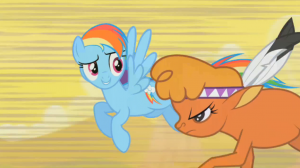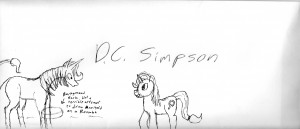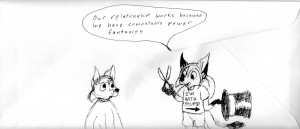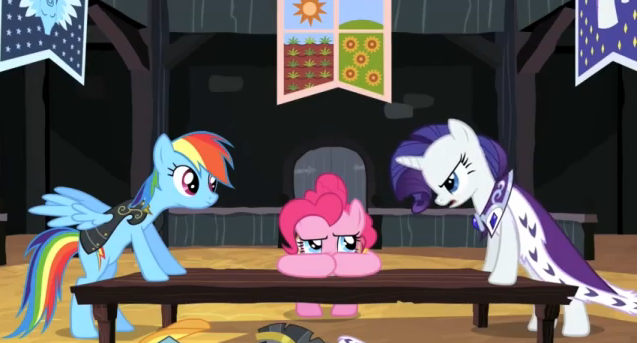Posts Tagged "Rarity"
Why Do You Even Want a Book?
Writing students seem to have a common obsession, getting a book with their name on it. I had a friend in undergrad who would always talk about how she just wanted a book. One book and she would be happy. She disregarded all criticism and fired all of her editors, because she felt they were getting in the way of her dream by telling her to slow down. Now she has the book, a novel. It’s available to buy now. I would link it, but it’s the worst book I have ever read, and I can say that without hyperbole. After the novel came out the head of the fiction department at her MFA said that this book might ruin her career as a writer. She was so driven by her goal of getting a book out that she ignored any reason why she wanted a book to begin with.
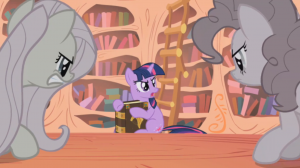
“This is my book, and people are going to read it…by the Christmas shopping season, regardless of how many more edits you think it needs!”
Asking someone why they want a book seems almost too obvious to answer, yet after they actually think about the question, they realize it’s actually much tougher than they thought. The answers I’ve mostly gotten were desires for attention, celebrity, money, etc. Of course, keep in mind nobody actually gives up these answers so easily or in so many words. Everyone’s like a contestant on “The Bachelorette,” even if they’re not playing “for the right reasons” they’ve all learned how to talk like they are. And no self-respecting writer readily thinks of themselves as a hack.
If anything I’m surprised how many people are willing to admit that they write as a means to get a book, and the book is the means to money, attention, fame, validation, whatever else they are looking for instead of the book. It’s a dangerous question: “Why do you want a book?” because it calls into question why you’re devoting your life to something. It’s a scary idea to think that you have no fucking clue, and believe me, many people don’t.
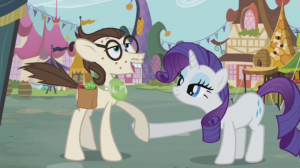
“I’m not on ‘The Bachelorette’ to find love. I’m mostly just publicizing my website. Getting physical with a hot white girl is just a bonus.”
And so you see students who will write anything to increase their publications. I’ve been lectured by a writer about how it’s about the quantity and speed of publications and not the quality of the writing. I had another writer go on for days about how Native American literature was the new trend in writing (apparently) and how she wished she was Native American so she could get the book deal (This isn’t just a willingness to compromise self-expression, but the entirety one’s self!) I heard about a student, without any fight, agree to his thesis adviser’s recommendation that he write genre fiction. That student admitted a hatred for genre fiction and a want to do a literary novel, but the adviser had a connection to a publisher. So he agreed so he could get the book. When he told me this story, he wanted me to pity him for having such a terrible thesis adviser, but I was just filled with contempt. If his own vision wasn’t something he could stand up for, then why should I care when it’s taken away?
I know the writing field is not as much of a meritocracy as it should be. I think all arts are corrupt in that way and probably always have been. So I won’t say that these people are going to fail, but what I am saying is that I don’t think these people will be proud of themselves in the end. There’s a difference between an artist and a content creator. The difference is that an artist owns their vision and manifests it, while a content creator manufactures a product. Maybe it’s just me projecting myself onto others, but I couldn’t be happy as a content creator.
I’ve never made a compromise with my editors or instructors that I didn’t agree with, that I didn’t feel still captured myself, my vision, my writing. I think the rarest and best answer is, “I want a book, because I write.” I want to share my stories with other people. The book is a venue for that. That’s why I want to be published, to serve my ideas. I see a book as a service for my stories; I don’t see my stories as a means to a book.
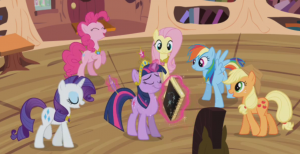
When I publish a book I want to be proud of what I wrote, not that I caught the market at the right time. I’m a writer, not a god damned real estate agent.
Then again, I’ve been spit on and dismissed as a writer, a theorist, and an editor so many times during my career as a student that I’ve developed a pretty mean chip on my shoulder. I know if you dissected me enough you would find vanity and validation motivating why I want a book, underneath the desire of serving my ideas. Maybe I’m also a Bachelorette contestant, here for the wrong reasons, but I’ve learned to talk the talk so well that I’ve tricked myself into believing my own fairy tales.
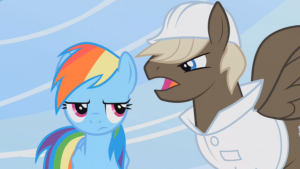
“I’ve never seen writing like yours before. Now if that sounded like a compliment, let me disambiguate, there’s no market for you. Who you are is someone nobody is interested in. Become someone else or you will fail.”
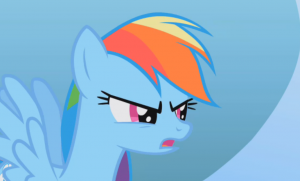
“I’d rather try and fail as myself than ‘be smart’ and succeed as someone else. An attempt, I owe that little to myself and my dreams. What will your definition of success bring me when I’m old and wondering what it is I’ve done with my life? Am I going to wonder what would have happened if I only had more courage when I was younger? Besides, I’m a damn good writer. I dominate the audience at readings and have little trouble getting published. I’m working out just fine as a humor writer, so thank you for your concern.”
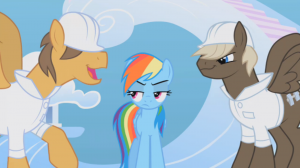
“You? A humor writer? That’s funny, because your writing makes me laugh…wait. I mean your writing is a joke. There, much better. Good self-edit.”
Who knows? I never put much thought into this question until I started my master’s program, which has a (sub)culture of among the students of being more interested in learning how to be a successful writer than in learning how to write (as if the two have nothing to do with each other). Considering my program is called a Masters of Professional Writing instead of a Masters of Fine Arts, this really should have been no surprise. I just wish someone would have told me earlier. I’m kind of lonely here, and I’m becoming angrier the longer I stay here. I’m having a harder time not just shouting “If you don’t have any fucking passion for writing, maybe you shouldn’t be getting a masters degree in it! Clear the bookshelves for people who care! Your life is too short to do something you don’t love! Maybe writing isn’t what your cutie mark is telling you.”
Note: I don’t know if this is a majority of people in my program or just a vocal minority, but it’s draining me just the same, and I want it to change.
Now, I’m not saying to give up if you’re not very good or not very successful. We all start off with varying degrees of bad writing. We have to work our way up. Writing well is something you can learn with focused study, right reason, time, and practice. I would never tell someone to give up on something they’re passionate about (#ratatouille). What I’m saying is if you don’t have passion for what you do, regardless of what you’re doing, you owe it to yourself as a mortal creature to be honest with yourself about it and not waste your life on it.
Maybe I’m the not the unheeded prophet, maybe I’m just wrong, naive, & idealistic. But I spent several weeks showing people how to SELL their creative works on Kickstarter. It’s not like my head is completely in the clouds and not grounded by captialism reality…right?
Over Burdened: Comic-Con, Southern California Review, and School
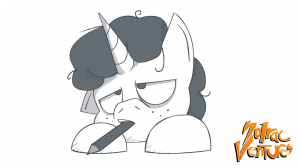
My OC Iambic Hexameter is exhausted with all the writing he has to do lately. Drawing by Kreid from Solrac Ventures
I have been more productive in the past few weeks than I have been in the last few months combined. That would be a good thing if it wasn’t so exhausting. Also, I’m kinda an agnostic Muslim, but I still play Ramadan. So all this work and thinking and stuffs has been while not eating or drinking while the sun is up. I’ve had to cheat on some days.
I fasted throughout Comic-Con so that I could get some extra Allah blessings as I ran up and down the San Diego Convention Center trying to get copies of the Southern California Review to select cartoonists that I respect. Since the other editor-in-chief and I have made the decision to start adding literary art comics as one of the genres that we publish.
I’m still waiting to hear back from most of the comic artists, whom I’ve been e-mailing individually, whom I’m also giving a month until I consider myself blown off and try for others.
So far we’ve confirmed Dana Claire Simpson, the artist behind the finished web comic Ozy and Millie and currently her syndicated comic strip Heavenly Nostrils which you can read for free on gocomics.com.
We have a tentative not completely a yes, but more like a probably from Nate Powell, graphic novelist who made Swallow Me Whole, Any Empire, and just released the first volume of a graphic biography about Civil Rights icon Congressman John Lewis called March.
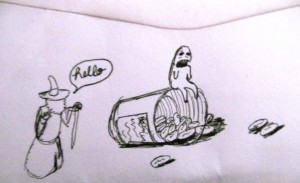
Swallow Me Whole Fan Art. I won’t show the reverse side because my Any Empire artwork came out terrible…
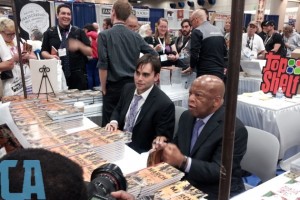
Comic Alliance actually took a picture of me talking to Nate Powell about the Southern California Review. (Top Left: Me, Top Middle: Nate Powell, Middle: Andrew Aydin, bottom right Congressman John Lewis
I wanted to have time to personally draw fan art and make a personal letter to each cartoonist explaining why I was a fan, why we were interested in their work, and why their involvement in Southern California Review would be important. I hated soliciting work as poetry editor, because I couldn’t really do things like this to show how sincerely I liked the poets work. I don’t like mass letters. I like a personal touch, but it takes a lot of time. I drew these envelopes while in a laundry mat the day before I left for Comic-Con.
Last weekend I took a television writing class taught by a writer on the Simpsons, Michael Price. Which was both fun and time consuming. It really taught me a lot about working in a writer’s room and really got me over my fear of them. This is something I’ll probably write about when I have more time. Doing this class right after doing a killer revision of a short story was creatively draining. I mean I literally finished the draft at 8AM after an all-nighter, took a shower, and drove to USC to attend this all day class which got out at 4.
But right now I still have a 6 page homework assignment to turn into that class, and I have a ton of reading to do for my thesis adviser, who I don’t think is too happy with my last revision of my short story. Her e-mail had a “We need to talk” vibe to it.
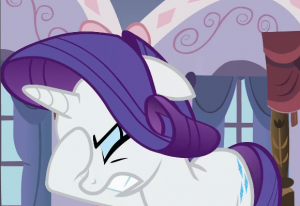
This is a real facehoof if you read my previous post.
The Art of the Dress: Lesson on Criticism
As I write this I am recovering from Comic-Con and battling against a deadline where a short story wrote needs to be second final drafted. After meetings with my adviser she had told me a lot of her comments verbally, and we were largely on the same page. I was shocked to see that on the written pages there were way more notes, and it was worse than I had thought.
Before we get started, any bronies and non-bronies might want to (re)watch the first part of the song to get the context of this post.
I had a little too much fun writing this story. I added a lot of avant-garde elements that were definitely too experimental. Some of the tools were things like excessive footnoting, the pretense of the story being historical fiction from the future about our times, animal dialects, pop culture references, sci-fi fantasy sequences, and treating animal languages as being tools manufactured by their perception of the world (my take on the Whorfian Hypothesis).
It was fantastic for a writer like me who loves the social sciences to create the politics and social dynamics of this world. And just in terms of technique, and what I needed to earn was one of the most ambitious pieces I had ever attempted. The first draft was far from perfect, but considering how many ingredients for failure I threw into the mix, I dared this story to fuck up. Yet with theory I knew how to make it all work, or so I thought, or so I’m thinking.
Regardless of how this turned out, I had an incredible time writing it: minding the intimate details. It was like I was twirling around my room, carefully cutting all the pieces of the story and watching them magically twirl about until they formed something whole and beautiful.*
Then the song kicks up again, and we enter the nightmare stage.
There’s a lot of “This doesn’t work for me,” and “I’m not buying this element,” and “I think we should remove this.”
For the most part an editor’s job is to provide you with solutions and usually the easiest solution to make the piece work. My problem was that most of my experimentation doesn’t exist in your everyday story. So the easiest fix when it doesn’t work is “Remove it.”
My editor an I are both on a firm deadline from my writing program to have this revised and signed off by the end of the week. The story is a strong enough story to exist without the avant-garde bullshit. However, the story doesn’t feel right without it. So I was posed with a moral question. Do I just send in an obedience draft where I mindlessly do exactly what my editor wants just to meet this deadline and then change it back to what I want before I publish it? As Rarity puts it, “There’s simply not much time.”
But I thought about something a friend sent me about a month ago. She said that her screenplay pitch had gotten all these weird criticisms about changing the main character and other such things to the point where they were asking her to write a completely different movie. I took a look at her treatment and pitch and saw where the real problems were. It wasn’t that her story was the wrong story to tell, or that she had picked the wrong protagonist, but that her pacing was off. The central conflict was in the first act instead of the second act, which made it seem more like a different character should have been the protagonist. I told her:
…[O]ne thing I’ve learned is that the surest way to ruin something is to take criticism at face value.
This is Rarity’s mistake. She does exactly what her friends tell her to do. They end up ruining the dresses. Remember an editor’s job is to find what doesn’t work and find A SOLUTION. It is your job as a writer to see if this solution is practical. Also to see if the editor is actually solving the real problem.
Being able to take criticism is a skill that requires a lot of practice and patience. Some people act like being able to take criticism is just not crying when facing a lion’s den of a workshop. It’s not just being able to handle advice with grace and poise regardless of how tactless or rude it might be. It is about being able to improve your work and yourself despite the message or the messenger.
One thing that appears a lot in my notes is the phrase “When/Why does this happen?” Even though there are entire sections that actually address the whys and the whens in a pretty heavy-handed and obvious manner. My first reaction to comments like these were rage. My editor wasn’t reading closely enough. They weren’t paying attention! I did my due diligence here, but they ignored it and commented on me as if it was a fault in MY WRITING!
But then I thought, maybe that part was just boring? That’s why they missed it. That’s the real criticism. Instead of calling attention to details again, I just need to make the ones I put in more interesting so they will stay with the reader. Perhaps by improving the prose or with better imagery, etc.
So for the avant-garde elements of this story, I need to do the same thing. I can’t make Rarity’s mistake. This is my story. When people read it they will be seeing it as a test of what I can do as a writer. I don’t want to have my name on something I don’t believe in.
Remember, it’s about “balanc[ing] style with adherence.”
Read MoreA Thought on Interpersonal Communication
I was on my colleague’s blog last week. She wrote her stance on cursing. I made a comment which inspired her next blog post about the bi-directionality of human communication.

